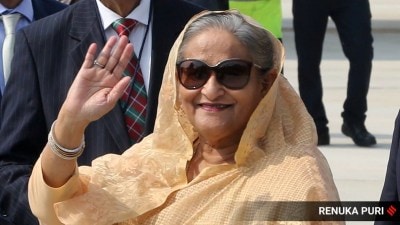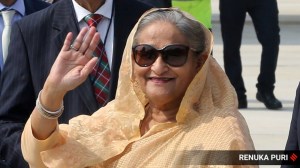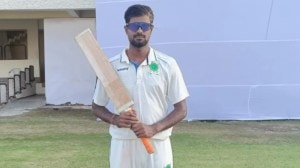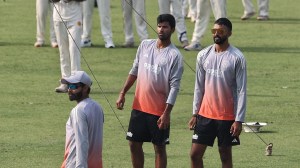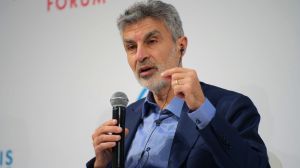War of tycoons
With a war over control over television, Russian media has entered the age of corporate warfare. What marked the beginning of the new phase...

With a war over control over television, Russian media has entered the age of corporate warfare. What marked the beginning of the new phase was the resignation of Maxim Boiko as chairman of the Russian State Property Committee after he and first Vice-Premier Anatoly Chubais attempted to seize control of the Public Russian Television (ORT), one of the two state-owned television stations.
Chubais and Boiko vowed to wrest control of ORT from the powerful media moghul and controversial banker Boris Berezovsky who was recently fired by President Boris Yeltsin from the post of deputy secretary of the all-powerful Russian Security Council.
The fight for the control of Russian media between Yeltsin’s allies led by Chubais and a group of influential bankers comes on the heels of a furious row that erupted in the wake of auctions of state telecommunications giant Svyazinvest and metal company Norilsk Nickel. It pitted former vice-premier and director of Uneximbank, Vladimir Potanin, against media tycoons Vladimir Gusinsky and Boris Berezovsky. Both Gusinsky and Berezovsky accused Chubais and the influential young reformer and Vice-Premier Boris Nemtsov of favouring Uneximbank which managed to attract enough foreign money to top the bidding for Svyazinvest. Press and television stations belonging to Gusinsky and the financial-industrial group built by Berezovsky gave strongly critical coverage of the Svyazinvest sale to Uneximbank, headed by Potanin.
Gusinsky’s Most-Media group owns independent NTV commercial television, Ekho Moskvy radio station, the influential liberal daily newspaper Sagodnya, the prestigious weekly Itogi magazine and other publishing concerns.
Berezovsky, whose Logo VAZ car sales company has a stake in the ORT station and the liberal daily newspaper Nezavisimaya Gazeta, has turned the ORT into a political tool. Logo VAZ along with seven other commercial companies, mainly banks, own about 40 per cent of the partly privatised ORT’s shares, while the state controls another 51 per cent. Some prominent opposition leaders, including presidential hopefuls, Communist Party leader Gennady Zyuganov and former secretary of Russian Security Council Gen. Alexander Lebed, have expressed alarm that much of the Russian mass media has fallen under the control of a small group of powerful financiers.
But Yeltsin has time and again vowed to protect press freedom, saying it is one of the biggest gains of democratic Russia following the collapse of the totalitarian Communist regime. However, now some journalists and media analysts worry that media independence is in danger as big companies and tycoons with strong links to the Kremlin buy lion’s share in leading newspapers and television stations.
After struggling to survive on state subsidies, the cash-starved Russian press has recently turned to big corporations for financial help. Indeed, for many, it’s a life-and-death battle as the cost of newspaper industry has increased immensely with plummeting readership. Evidence of possible media dependence appeared in 1996 during the presidential elections when many news outlets reversed years of criticism of Yeltsin and campaigned for his re-election. The Kremlin and its business allies co-opted televisions and newspapers, getting willing support from many business tycoons and journalists who feared that a Communist victory would end press freedom.
After his re-election for the second term, Yeltsin suitably rewarded all the tycoons who campaigned for him. For example, he signed a decree awarding Gusinsky’s NTV the sole right to broadcast on Russian TV Channel 4 and appointed Berezovsky as deputy secretary of the Security Council, only to fire him later following difference over Svyazanvest.
Since then, the media has been undergoing a corporate takeover that worries advocates of an independent press. After a brief period of independence, Russian media outlets seem eager to "blindly follow" their owner’s instructions, they say. "The tendency is damaging since it involves newspapers that the people considered impartial, such as Izvestia and Nezavisimaya Gazeta which have recently been purchased by bankers and business enterprises," says a Moscow-based media analyst.
"During Communist times, our press and television reported to the Communist Party leadership," says Yasen Zasursky, dean of the Journalism Faculty of the Moscow State University. "Now they report to political and business tycoons."
If the latest trend is any indication, Russia’s biggest companies, strongly tied to the Kremlin, are increasingly investing in mass media as a way of increasing their political clout. Says Igor Golembiovsky, former chief editor of Izvestia: "The Russian mass media is gradually turning into an instrument to defend the interests of those in power."
The saga of Izvestia‘s battle for editorial independence from Uneximbank and Russia’s largest oil giant LUKOIL has long highlighted the struggle of many of Russia’s newspapers to retain freedom.
Faced with the growing power of corporate owners determined to grasp editorial control of Izvestia, Golembiovsky had to bow out of the long-running struggle for the paper’s independence after Uneximbank and LUKOIL took controlling stakes in the paper. While LUKOIL is alleged to have close ties with Russian Premier Viktor Chernomyrdin, Uneximbank is known to have strong links with Chubais and Nemtsov.
At present, Uneximbank is an aggressive investor in the Russian media market. Besides national dailies such as Izvestia and Komsomolskaya Pravda, it owns significant stakes in many regional newspapers. In anticipation of an ensuing media war between top Russian tycoons, the bank has already launched an ambitious daily Russky Telegraph. In response, Gusinsky and Berezovsky recently started Noviye Izvestia with Golembiovsky as chief editor.



- 01
- 02
- 03
- 04
- 05


